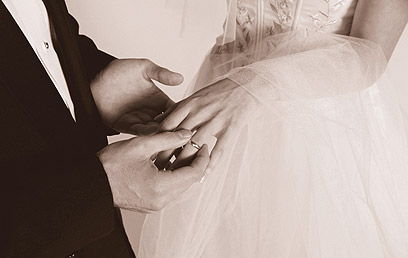
Most Israelis wish to be wed by Orthodox rabbi
Ynet poll finds that most Israelis believe 25-30 is ideal age for marriage, majority would not object to marriage between couples with different religious views
Perhaps there will be no de facto weddings at this time but the weekly survey conducted by Ynet's Jewish channel and Gesher Educational Affiliates will help you prepare for summer weddings.
According to the survey the ideal age for marriage is 25-30, and it appears that we shall apparently be happy to find an Orthodox rabbi under the chuppah (not just the bride). Findings also showed that the majority of the public would not oppose marriage between couples with different religious views. The survey, conducted by the Brands Institute among 500 respondents, is a representative sample of the adult Hebrew speaking Jewish population in Israel.

'Strengthening of marital institution'
In answer to the question "what in your opinion is the ideal age for marriage" some 58 percent of respondents said it was 25-30. An additional 30 percent said that couples should marry as young as possible up to the age of 25, 6 percent said they would not marry until they turn 30. The remaining 6 percent wondered why they should marry at all.
Division into religious denominations showed that strictly Orthodox and religious couples support marriage at a young age more than others – 56 percent and 92 percent respectively. Among secular couples there was a clear majority (75 percent) who said they would wait until 25-30, while others said they would prefer a later marriage (10 percent) rather than an early marriage (9 percent).
Among traditional couples 59 percent said 25-30 was ideal, 29 percent maintain that couples should marry as early as possible, and only 3 percent said they would wait until at least 30.
So what type of rabbi do most couples want to see under the chuppah?
A clear majority of 80 percent stated their preference is primarily for an orthodox rabbi, and 12 percent said they would prefer a conservative or reform rabbi to hold the ceremony. Those closer to tradition (57 percent) said they would choose a rabbi they knew and relied on or a Tzohar rabbi. The remaining 23 percent said they would gladly accept any rabbi sent to them by the rabbinate. One percent of respondents said they would prefer someone else, such as a one of the celebrities that conducts marriage ceremonies.
Division into religious denominations showed that even non-religious couples prefer orthodox rabbis as opposed to others - 86 percent and 8 percent respectively among traditional Jews, and 66 percent as opposed to 22 percent among secular Jews.
What about your son marrying an ultra-orthodox woman?
The third question put to respondents was how they would respond if a close family member married a partner with a different religious view. Some 69 percent said it would not bother them, while 24 percent said they would be very upset but would learn to come to terms with it, and 1 percent said they would not be able to accept such a situation and would break off ties with the wayward family member.In an analysis according to religious denominations it was found that traditional Jews are more tolerant. Some 82 percent said they would not object, and 9 percent said they would be upset but would deal with it. Among strictly Orthodox Jews the picture was very different: Only 36 percent said they would not object as opposed to 60 percent who said they would, but would have to deal with it.
Have you ever heard of a strictly Orthodox Jew who sits shiva for a family member who crossed the lines? Only 2 percent said they would cut off ties. Among religious and secular Jews 66 percent of respondents said they would have no problem with such a marriage, as opposed to 29 percent and 28 percent respectively who said they would object but would ultimately come to terms with it.
Shoshi Becker, the CEO of Gesher Educational Affiliates, says she was surprised by the high level of tolerance for different religious views. Nonetheless, she explains the moderate approach by saying that it is common among Israeli families to hold different religious views. As to the preference of marrying later on in life, Becker said it was due to Western influences.
Becker added that that the survey reflects a strengthening of the marital and family institutions, and the preference for an orthodox chuppa shows that the majority of Israelis seek the element of Jewish tradition.










